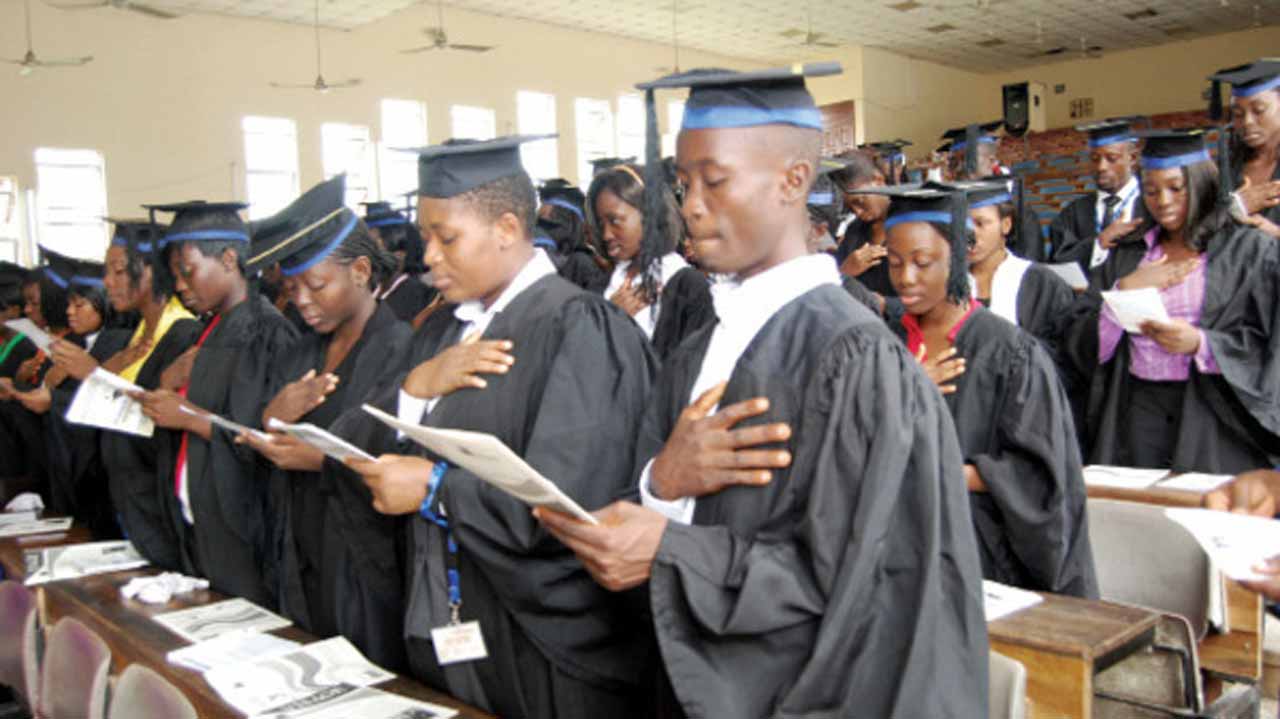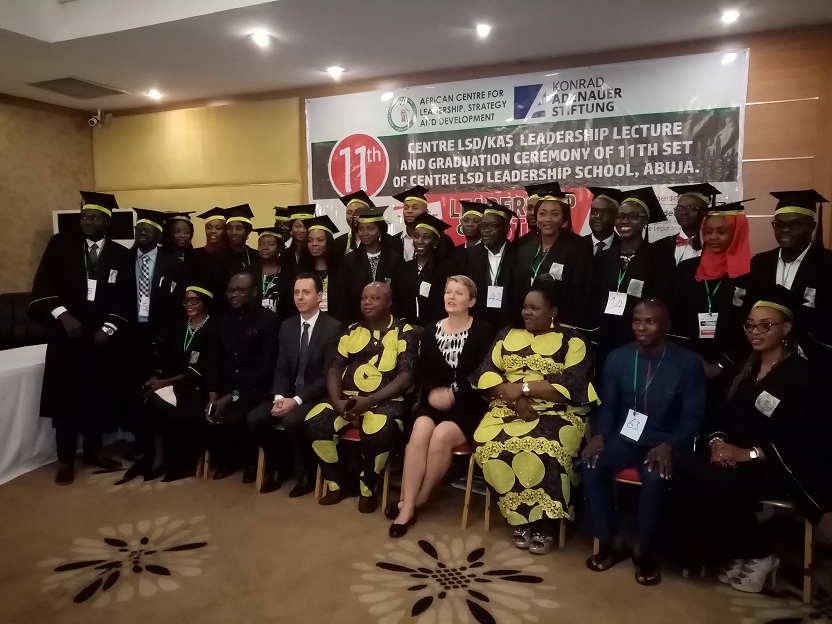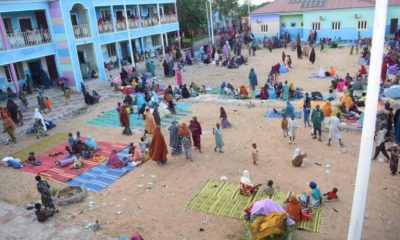Education
99,985 Nigerian Students Left for UK Varsities in 5 Years — Minister

The Minister of Interior, Dr Olubunmi Tunji-Ojo says statistics indicate that no fewer than 99,985 Nigerian students left the country to enrol in universities in the United Kingdom between 2017 and 2022.
The minister disclosed this at the opening ceremony of the 2023 University of Lagos International Week on Monday, in Lagos.The theme of the international week is ‘Breaking the Borders of Partnership’.“Every year, over 100 Nigerian students benefit from the scholarship for postgraduate and PhD degrees, I speak from students personally; we have hundreds of professionals and entrepreneurs leaving our shores to break new grounds across our lands.“And on our part, we must ensure that we play our part in the actualisation of their dreams. They carry our identity, one which not only aids their pursuit, but also defines them.”According to the Higher Education Statistics Agency (HESA), reports have shown that about 99,985 Nigerian students left this country to enrol in universities in the United Kingdom between 2017 and 2022.“While many may contend that majority of these students have simply ‘JAPA’ for other reasons, we cannot also deny the fact that a larger chunk of these students have left with the purest of intent to seek further knowledge for self advancement.“Now, in going all through this therefore, I may want to ask, why our students should now suffer to acquire international passports, even when they have paid for it.“Their pursuit of breaking new grounds across borders, is one which gives us great joy as through our children, we sustain the future,” he said.The minister said the ministry had commenced the automation of end-to-end passport application process, and had given a timeline from which Nigerians would begin to experience the “sweet experience.“By implication, Nigerians will not need to wait longer than two weeks before they get their passport.“By January next year, Nigerians will be able to complete this application process online, and by February next year, with collaboration and partnership with other relevant stakeholders, Nigerians will have their passport delivered to their homes, offices and other locations of their choice,” he stated.According to him, this will also be extended to the visa application process, with technology deployed throughout the entire process, to make it as seamless as possible.The minister said to achieve this, his office had set everything into motion to open 12 more visa application centres across the world.“In this regard, we are also working on strengthening our visa- on-arrival policy.“We are working with the Ministry of Foreign Affairs to enforce the principle of reciprocity and a committee has been set up in the ministry to achieve this,” he said.Tunji-Ojo noted that the theme of the event reminded citizens that the challenges faced as a people were not confined by geographical boundaries.He said that whether it was addressing climate change, promoting global health, ensuring peace and security, or fostering economic prosperity, the world was more interconnected than ever before.According to him, there is the need to embrace partnerships that transcend borders, to tackle these complex issues effectively,“In breaking the boundaries of partnership, we are not using rhetoric. We lead from the front. This was strongly expressed by President Bola Tinubu, while recently addressing the United Nations General Assembly (UNGA 78),” he said.The minister expressed his unwavering faith in the transformative power of education and research.He said that together, citizens could break the borders that hindered collaboration and unlock a brighter future for Nigeria, and by extension, Africa.“ Let our academic community be at the forefront of this noble endeavour, inspiring the next generation to build a Nigeria that thrives on unity, innovation, and shared prosperity.“I am making this call to the academic community, using this citadel of learning as a point of contact. As custodians of knowledge, you have a pivotal role to play.“ I implore you to continue your invaluable work, not only within the walls of your institutions but also in the broader context of our society.“Through innovative research, academic recommendations and forward-thinking curriculum, you can instill in our new generation of Nigerians, a profound understanding of the imperative of collaboration over competition.“Your academic recommendations hold the potential to reshape policies and practices. Engage with policymakers, industry leaders and civil society to ensure that your insights are translated into action.“Advocate for evidence-based decision-making that prioritises the welfare and prosperity of all Nigerians,” he said.On his part, the keynote speaker at the event, Prof. Iain Gillespie, Vice Chancellor, University of Dundee, U.K, said institutions, industries and policy makers across the globe must work together to address common challenges.According to him, partnership has the ability to bring about expertise and capacity.“It requires genuine alignment of good and equitable relationship to deliver meaningful impact,“Universities on their part, are indeed meant to be centres for commitment to excellence in knowledge, character and service to humanity.“They must strive to transform lives locally and globally through triple intensity, to deliver on social purpose,” he said.Earlier in her welcome address, the Vice Chancellor of UNILAG, Prof. Folasade Ogunsola, said at the turn of the 21st century, the world had started to come to terms with the impact of globalisation.She said this was so in all its ramifications on how life would be lived in the present and in the future.According to her, global-higher education sector was not left out as it was itself both a driver of, and a respondent to the changes being witnessed.She noted that there was growing recognition among its managers on the place of universities and like institutions, as research, teaching and learning arena,Ogunsola said managers believed that if such institutions were going to be valuable to the knowledge economy of the 21st century, they would have to adapt to the imperatives of internationalising higher education.“As we all know, the productivity of academia as the gateway to a knowledge economy is enriched by cross-fertilisation of thoughts and ideas that add depth and breadth to knowledge and understanding.“It is against this backdrop that University of Lagos adopted its internationalisation agenda and strategy about a decade ago.“The COVID-19 pandemic, for all its negative impact, was unprecedented in its elevation of the awareness that those at the vanguard of the knowledge economy would need to take urgent action to evolve a new culture committed to promoting local and global knowledge sharing, partnerships and collaborative actions to advance teaching, learning and research.“Like never before, it became clear that the world had, indeed, become a global village and we all need to be talking to one another, teaching and learning from one another, collaborating with one another to unlock the potential of research for solving human problems.“But the pandemic did even more, it compelled the world to fast track its embrace of technologies that enable us to break down the traditional barriers of time and space. What more leverage do we need for internationalising higher education?“My strategic plan which is premised on four cardinal pillars namely: Financial Reengineering, Infrastructural Development, Research and Manpower development with the acronym “FIRM” aims to make UNILAG Future-Ready, yielding inquiring minds, discoveries, sound character, and a globally impactful workforce while addressing the developmental needs of today.“In this plan, internationalisation remains a veritable route to foster the improvement of the quality of education and research as well as expose our staff and students to global best practices, and assist them to make meaningful contribution to the society in an increasingly globalised world,” Ogunsola stated.The Executive Secretary TETFund, Mr Sonny Echono, said the organisation was working hard to promote internalisation in terms of scholarship.He said that it had offered scholarship to over 40,000 scholars to do their Masters and PhD programmes abroad.“We want to also be able to attract foreign students from all over the world to come to Nigerian universities and we can only get this done by improving not just our curricula to be globally competitive, but also ensure that we have a stable academic calendar.“Our lecturers must also take up the responsibility of ensuring that when they supervise the postgraduate students, they do so on time, so that the duration of the programme will not be too long.“I am pleased with the quality of guest speakers that gathered here from across the globe to focus on issues of our linkages, partnership, collaboration and building of capacity to attract international grants, participate in multidisciplinary research and being able to find joint solutions to global challenges,” Echono said. (NAN)Education
Stakeholders Blame Exams Body, Parents over Mass Failure

Stakeholders in the education sector said, the mass failure in the 2025 West Africa Senior Secondary Certificate Examinations (WASSCE) stem from systemic issues attributed to the examination body, parents and the students
The stakeholders spoke in separate interviews in Abuja on Thursday.
Founder, Exam Ethics Marshall International (EEMI), Ike Onyekere faulted the systemic malpractice and deep-rooted corruption within Nigeria’s examination ecosystem.
The West Africa Examination Council (WAEC) had revealed a sharp decline in performance in the 2025 SSE results compared to the previous year.
Out of a total of 1,969,313 candidates who sat for the examination across 23,554 schools, only 754,545 candidates, representing 38.
32 per cent obtained a minimum of five credits, including English Language and Mathematics.Onyechere decried the 38.32 per cent credit pass rate recorded in this year’s examinations as a “very poor result,”
He, however, noted that the decline was not unexpected due to challenges encountered during the exams.
According to him, there were serious logistical issues during the exams such as power outages, poor supervision, and lack of proper oversight which contributed to students’ poor showing.
“I am not surprised because these logistical issues, as critical as they were, they were ignored during and after the exams.
“No person talked about how those kinds of issues should be addressed in terms of how they affected the performance of those students.
“No person talked about what happened after their papers were collected from them, when they did finish their allotted time and when there was no light.
“So these are some of the questions we need to address,” he said.
Onyechere further criticised students’ growing reliance on “magic centres” and malpractice rings, arguing that many students no longer prepare sincerely for their examinations.
He said most of the students have their mind fixed on magic centres, and other forms of malpractices unfettered and with no consequences.
He accused WAEC and its sister examination body of enabling malpractice by repeatedly failing to name and shame individuals and institutions complicit in exam fraud.
“Every year, WAEC releases statements saying schools were involved in malpractices but where are the names? Who are these schools? Who are the supervisors?
“They recycle these supervisors and protect them,” he said
Citing his experience in the Federal Ministry of Education, he alleged that past attempts to publish and blacklist indicted schools and individuals were stifled.
He praised the Joint Admissions and Matriculation Board (JAMB) for its comparative transparency, saying, “at least, JAMB names CBT centres and schools caught in malpractice and takes them to court.
Onyechere admonished WAEC to take cue from JAMB, in addressing the menace of malpractices.
For meaningful change, he called on WAEC to publish names, sanction schools, blacklist corrupt officials, and take concrete action, not just about release of statements.
He also advised students to reject malpractice, rather, discover and develop their true talents.
Also, Dr Jekayinfa Olatunji, a Fellow with the National Mathematical Centre (NMC), called for a national education emergency roundtable, reforms in exam preparation strategies, and closer monitoring of learning standards at all levels.
Olatunji said until tangible solutions are implemented, the futures of millions of Nigerian students would hang in the balance.
“In 2024, no fewer than 1,805,216 students sat for waec exams out of which 1,332,089 students passed at least 5 subjects including English Language and Mathematics at credit level and above, representing 72.12 per cent pass.
“Ordinarily, the results may seem good, but, what about the remaining 27.88 per cent who didn’t get five credits with English Language and Mathematics?
“The students might not have progressed in their education that year.
“Now, the worst has happened in 2025. Out of 1,969,313 students who sat for WASSCE exams, only 38.32 per cent passed five subjects including English Language and Mathematics.
“The remaining 68.68 per cent didn’t pass five subjects including English Language and Mathematics.
“What this means is that only 754,641 students out of 1,969,313 succeeded in having scores that could earn them tertiary institution admissions,” he said
He advised the education stakeholders to take proactive steps to forestall a repeat of the woeful performance in 2026.
Similarly, a civil servant and a parent, Ijeoma Osita, attributed the poor performance in the examination to both students’ attitudes and the role of parents in fostering academic irresponsibility.
Osita decried increasing culture of academic laziness among students and misplaced priorities by parents.
She further lamented that the quality of learning was fast diminishing due to an over-dependence on technology without critical thinking and originality.
According to her, many students no longer commit themselves to studying or building academic discipline, choosing instead to rely heavily on shortcuts such as Artificial Intelligence (AI), examination malpractice, and plagiarism.
“From what I have observed, many students are not ready to go the extra mile to study, build their capacity and equip themselves academically.
“They rely so much on AI and ‘expo’. Unfortunately parents endorse the negative trend, in having their children pass exams.
“They fail to harness the potential in their children by encouraging them to study harder, or even employ extra hands to coach them in the areas of weakness.
“The parents prefer to hire “machinery,” sometimes to write exams for their children.
“Some will even encourage and finance their children to leave the school, where they have attended for years, to register them in ‘miracle centres’,” she said.
She urged parents to take more responsibility in guiding their children, stressing the importance of discipline, hard work and quality education over superficial success.
| ReplyForwardAdd reaction |
Education
WAEC, Education Ministry Resolve Result Glitch Updates Ready in 24 Hours

By Elijah Oguche, Abuja
The Federal Ministry of Education has announced the resolution of a technical issue affecting the 2025 West Africa Senior Secondary Certificate Examinations results.
The issue occurred during post-release processing in subjects where paper serialisation was implemented as part of WAEC’s exam security measures.
A statement by Folasade Boriowo, the director of press of the ministry on Thursday said the Ministry commended the West African Examinations Council for its swift response, transparency, and professionalism in resolving the glitch.
Updated results will be accessible via the result checker portal within the next 24 hours.The Ministry also appreciated the patience of affected candidates and assured the public of its continued pursuit of fairness and credibility in assessment processes.
“This development reinforces the Honourable Minister’s broader education reform agenda, which prioritizes examination integrity across all bodies under the Ministry’s supervision, particularly WAEC and the National Examinations Council (NECO). In line with this, both bodies are set to commence a phased rollout of Computer-Based Testing beginning with objective components in November 2026.
“The adoption of CBT represents a critical step toward curbing malpractice, preventing question leakages, and restoring public trust in the examination system. It is a necessary reform to ensure Nigerian students are assessed strictly on merit and that their certificates retain credibility both locally and internationally.
“Dr. Alausa emphasized that safeguarding the integrity of examinations is not optional—it is essential. Upholding high standards, he noted, protects the future of our young people and sustains Nigeria’s global reputation,” Boriowo stated.
Education
FG celebrates 17 year-old Nafisa Aminu for emerging world best in English contest

By Tony Obiechina Abuja
The federation government has commended Miss Nafisa Abdullah Aminu, a 17-year-old student from Yobe State, for emerging as the World’s Best in English Language Skills at the 2025 TeenEagle Global Finals held in London, United Kingdom.
Minister of Education, Dr.
Tunji Alausa and the Minister of State for Education, Prof. Suiwaba Sa’id Ahmed, on behalf of the Federal Ministry of Education, conveyed the federal governments commendation in a statement by the Director of Press and public Relations, Mrs Folashade Boriowo on Wednesday.Representing Nigeria through the Nigerian Tulip International College (NTIC), Miss Nafisa outshone over 20,000 participants from 69 countries, including native English-speaking nations.
Her victory is not only a personal milestone but a resounding affirmation of the Renewed Hope Agenda for Education championed by President Bola Ahmed Tinubu, which continues to empower Nigerian youth to compete and excel on the global stage.
According to the statement, “This extraordinary achievement not only brings pride to the nation but also underscores the effectiveness of the education-focused components of the Renewed Hope Agenda.
” The President’s unwavering belief in human capital development through sustained investment in the education sector is beginning to yield global recognition, as demonstrated by Nafisa’s remarkable success.
The Ministers jointly commended Nafisa for her brilliance, determination, and discipline. They described her victory as a “proud moment for Nigeria and a strong endorsement of the Federal Government’s ongoing efforts to revitalise the education sector and raise globally competitive students.”
The Ministry extends heartfelt appreciation to His Excellency, Governor Mai Mala Buni, whose visionary investment in instructional materials and education reform has created an enabling environment for students like Nafisa to thrive. This achievement is a shining testimony to the renewed collaboration between the Federal Government and sub-national governments, and a clear indication that our shared commitment to quality education is bearing fruit.
Special commendation was further extended to the Yobe State Commissioner for Basic and Secondary Education, Dr. Muhammad Sani Idriss, for his tireless efforts in strengthening the state’s educational institutions and supporting academic excellence. Also acknowledged is the vital role played by the management and staff of NTIC in nurturing Nafisa’s academic growth. Eulogising the dedication and guidance of her parents and teachers, the Ministry noted that they have played a pivotal role in shaping her academic journey, exemplifying the power of community in nurturing excellence.
“This is not just a personal victory; it is a national milestone that affirms the capabilities of Nigerian students to excel on the global stage,” the Ministers stated.
Miss Nafisa’s success reflects the kind of youth the Ministry is determined to raise—globally competitive, intellectually empowered, and rooted in national pride. It reinforces the Ministry’s agenda to continue investing in instructional materials, teacher training, and student development to ensure that Nigerian children receive education that meets international standards.
The Federal Ministry of Education encourages students across the country to be inspired by Nafisa’s achievement and reaffirms its commitment to building a future where many more Nigerian students can stand tall among the world’s brightest.
| ReplyReply allForwardAdd reaction |

















